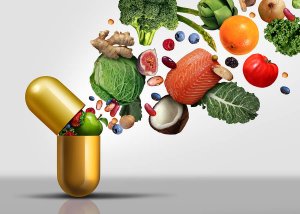Why Vitamins Are Essential for Your Diet

Vitamins are essential components of your diet. They support your body’s development and growth, and some can’t be produced by your body. However, they’re essential to make many organs healthy and function correctly. It’s because of this that vitamins are vital elements that you can get with a healthy diet and some supplements.
There are many types of vitamins, thirteen in total. All of them work together with the enzymes and cells of your body to strengthen the metabolic processes and add a high dose of energy. In this article we’ll analyze how these micronutrients influence your diet, and why they’re a fundamental part of it.
Vitamins form part of a food chain

Many of the foods that you eat contain vitamins. For example, all vegetables and fruits contain essential vitamins, or micronutrients, that enter your body when they’re eaten. The same happens with many animals that we eat. These animals feed on fruits and vegetables as well, thus absorbing the micronutrients into their own bodies. When you eat them, you also ingest some of those vitamins.
You might be interested in: Avitaminosis: The Lack of Vitamins
They strengthen your body
Many vitamins, for example vitamin C, work together with the immune system. They support the body in fighting all kinds of infections and diseases. Recent research highlights the use of fruits with a high vitamin C content to prevent diseases like obesity and to prevent weight gain.
Others, like vitamin E, help take care of your skin, nails, and hair. That is, all of these micronutrients provide benefits to your body in general, even more if you follow a special diet.
Some vitamins support muscle growth

If you accompany your diet with physical or aerobic exercise, then you could choose to consume vitamins B3 and B6. These vitamins are essential to support muscle development and growth, they also help the recovery of body tissue and skin elasticity. Foods and fruits like pineapple, avocado, grapes, plantains, and others contain vitamins B3 and B6. And there are also complete supplements that include them.
You might be interested in: 6 Healthy Vegetables to Improve Muscle Mass
Many vitamins serve as complements to your diet
If you eat a varied and balanced diet, then you’re providing your body with a wide variety of vitamins. However, sometimes with more restrictive diets or in times of illness or stress it’s better to boost your diet with vitamin supplements. These assure that you’re receiving the proper amount of all the micronutrients.
They can help prevent diseases like anemia or even malnutrition. For example, vitamin B12 increases the number of red blood cells in your body. Different meats and fish usually contain B12. In most cases, B12 comes from animals.
They provide a large number of antioxidants
Vitamins A, C, and E have very powerful antioxidant properties and play an important role in the protection of your body’s cells. Due to this, they neutralize free radicals, which can cause aging and skin deterioration. Therefore, a diet that includes vitamin-rich foods adds a larger number of antioxidants to your body, supporting your body’s well-being.
Additionally, many of these vitamins are used in skin and rejuvenation treatments. It’s important to highlight that the benefits of these vitamins, when they accompany a proper, balanced diet, are surprising. These vitamins also help any type of person in general. For example, recent studies in the United States have shown that a high concentration of vitamin D in women promotes fertility and healthy pregnancy.
However, you should control your vitamin consumption, since an excess of vitamins in the body can cause serious health problems. It’s very important to limit your consumption to doses recommended by nutritionists, without exceeding the limits.
All cited sources were thoroughly reviewed by our team to ensure their quality, reliability, currency, and validity. The bibliography of this article was considered reliable and of academic or scientific accuracy.
- Ganceviciene, R., Liakou, A. I., Theodoridis, A., Makrantonaki, E., & Zouboulis, C. C. (2012). Skin anti-aging strategies. Dermato-Endocrinology, 4(3), 308–319. https://doi.org/10.4161/derm.22804
- Mumford, S. L., Garbose, R. A., Kim, K., Kissell, K., Kuhr, D. L., Omosigho, U. R., … Schisterman, E. F. (2018). Association of preconception serum 25-hydroxyvitamin D concentrations with livebirth and pregnancy loss: a prospective cohort study. The Lancet Diabetes & Endocrinology, 6(9), 725–732. https://doi.org/10.1016/S2213-8587(18)30153-0
- Anhê, F. F., Nachbar, R. T., Varin, T. V, Trottier, J., Dudonné, S., Le Barz, M., … Marette, A. (2018). Treatment with camu camu (Myrciaria dubia) prevents obesity by altering the gut microbiota and increasing energy expenditure in diet-induced obese mice. Gut, gutjnl-2017-315565. https://doi.org/10.1136/gutjnl-2017-315565
This text is provided for informational purposes only and does not replace consultation with a professional. If in doubt, consult your specialist.








